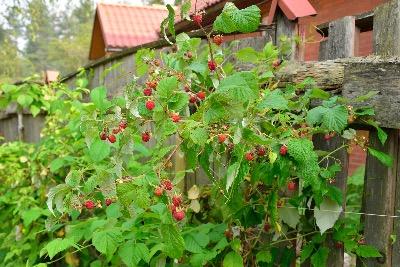Create a fruit garden
Handy tips from our grower. Strolling through the garden and snacking on delicious berries, raspberries and strawberries along the way. Planting a fruit garden makes for a very tasty retreat. We are happy to explain where to start.
The best time
The best time to plant fruit bushes is in autumn, so they have a chance to take root well before winter. But most people prefer gardening in good weather. And with a little extra care, it is not a problem to start a beautiful small fruit collection in spring. It even has advantages: because of the higher temperature, the plants grow faster. Whether you plant in autumn or in spring, you should not expect a harvest from either the red or white berries the first year. There are some berries that yield from the first year, but only from the second year will the yield be very good. The ideal planting time in spring differs depending on the type of soil. On reasonably dry sandy soil, the bushes should be in the ground before May. On wet clay soil, the situation is different: do not plant your berry bushes there until May-June. You should spray both soil types in dry weather. However, do not over water the bushes. Do not spray a little water every evening, instead water thoroughly once, at most twice, a week.

A good location
A fruit garden should always be in the sun. Therefore it can often be beautifully combined with the vegetable garden, which has the same requirements. Here you can plant the fruit bushes as a hedge, or place them in rows between the vegetables. A combination with an orchard is also possible, as there is usually sufficient sunlight there as well. But setting up a part of the garden especially for fruit, also has advantages. That way, during the berry season, you can cover your shrubs with nets in one go without too much effort. When selecting a location for the fruit garden, choose an area that receives sunlight for at least half the time that it is light. Preferably the afternoon and evening sun, as only morning sun is too weak. In particular, take into account the position of the sun in summer and autumn. The sun is important for the taste of the fruit, as the sunlight stimulates the development of sugars. But it is also important for the formation of the buds, which takes place in the autumn. Especially then, the plants need to receive plenty of light.
Selecting
Start with varieties that give the best chance of success and only expand the garden later with 'more difficult' varieties such as goji berry and cranberry. A selection of red and white berries, possibly supplemented with blackcurrants for the connoisseur, offers plenty of treats in summer. Complete the garden with blueberries, which are almost always successful. Raspberries are always delicious and autumn raspberries are the best choice for the private gardener. They can be harvested a little later, which allows you to extend the season. In addition, the normal raspberry is often plagued by worms; autumn raspberries are not affected by them. When choosing bushes, careful consideration should be given to the purpose of the fruit garden.
If you want to enjoy nice treats from your own garden plant as many different varieties as possible. This extends the season and allows you to enjoy the yield for as long as possible. For example, choose a gooseberry that bears fruit early and one that bears fruit late, that way you can harvest for weeks.
If you want to make jam with your fruit yield, it is better to plant several bushes of the same variety. You will then have sufficient harvest to process the berries immediately after picking.
A final tip from the grower is to not always opt for well-known varieties. ''Always choose fruit that fits well in your garden. Don't buy a random fruit tree or shrub from the garden centre of a variety you know from the supermarket. Often, commercial varieties do not do as well in private gardens. These varieties often only thrive with a strict spraying policy and it is just so much nicer to enjoy non-toxic fruit in your own garden. Many old varieties are more resistant to diseases and will yield a much better harvest.''








